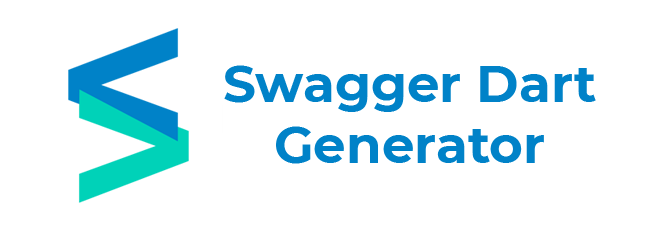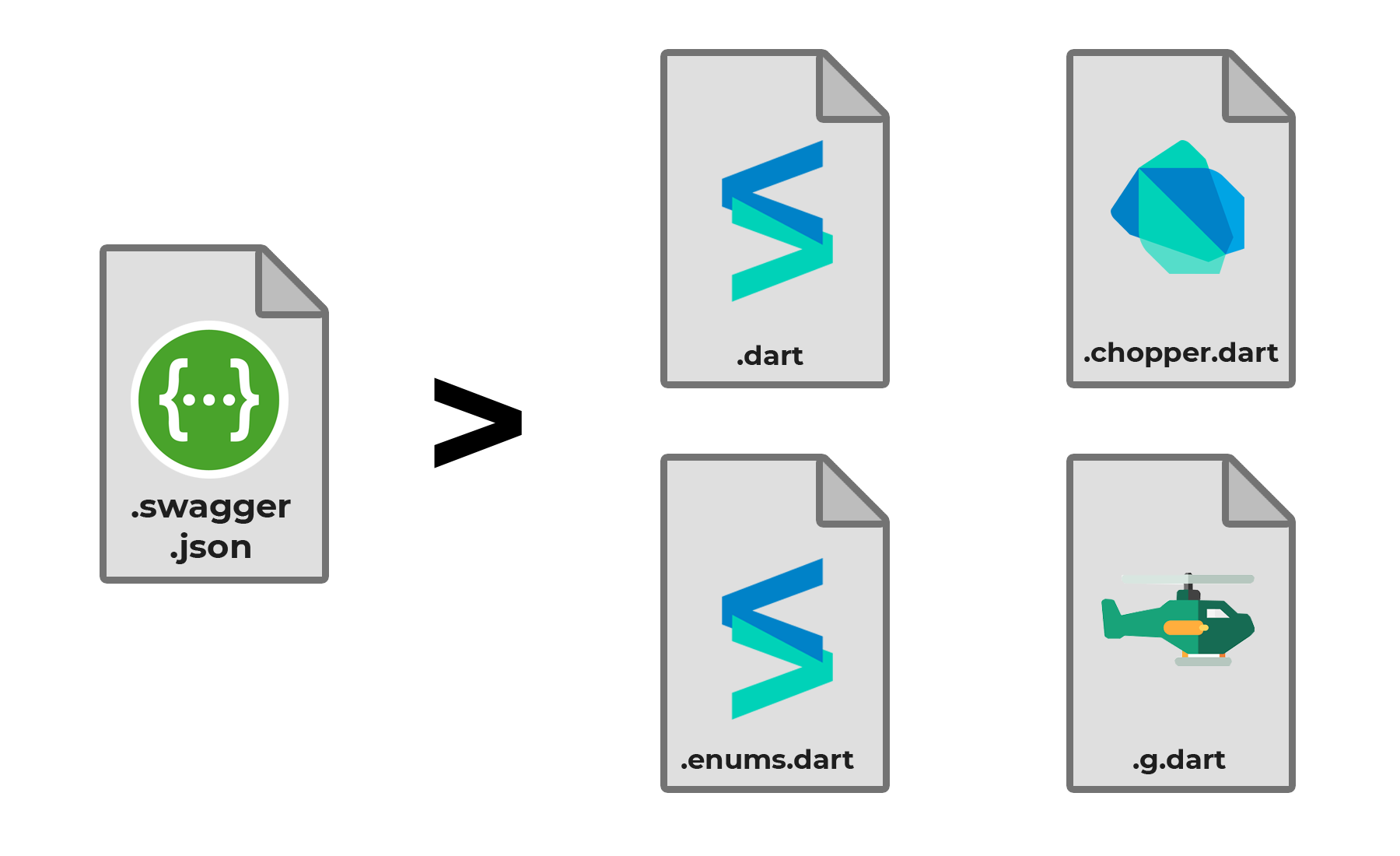SwaggerDartCodeGenerator is a code generator that looks for *.swagger files and builds .swagger.dart files, based on the schema. Code generation based on Chopper and JsonAnnotation models and can be configured for your needs.
In general case for each .swagger file three outputs will be created.
.dart generated by Swagger dart code generator, contains all models, requests, converters, etc.
[Since v1.2.0] .enums.dart generated by Swagger dart code generator, contains all enums and enums mappings.
.chopper.dart - generated by chopper.
.g.dart - generated by json_serializable.
The generated code uses the following packages in run-time:
dependencies:
chopper: ^6.1.1
json_annotation: ^4.8.0Add the following to your pubspec.yaml file to be able to do code generation:
dev_dependencies:
build_runner: ^2.3.3
chopper_generator: ^6.0.0
json_serializable: ^6.6.1
swagger_dart_code_generator: ^2.10.4Then run:
dart pub getor
flutter pub getNow SwaggerGenerator will generate the API files for you by running:
dart run build_runner buildSwagger generator offers some configuration options to generate code. All options should be included on build.yaml file on the root of the project:
targets:
$default:
builders:
swagger_dart_code_generator:
options:
# custom configuration options!| Option | Default value | Is required | Description |
|---|---|---|---|
input_folder |
- |
true |
Path to folder with .swagger files (for ex. swagger_examples, or lib/swaggers). |
output_folder |
- |
true |
Path to output folder (for ex. lib/generated). |
input_urls |
[] |
false |
Here you can mention list of files to be downloaded from the internet. You can check example of usage. |
with_base_url |
true |
false |
If this option is false, generator will ignore base url in swagger file. |
use_required_attribute_for_headers |
true |
false |
If this option is false, generator will not add @required attribute to headers. |
with_converter |
true |
false |
If option is true, combination of all mappings will be generated. |
ignore_headers |
false |
false |
If option is true, headers will not be generated. |
additional_headers |
false |
false |
List of additional headers, not specified in Swagger. Example of usage: build.yaml |
enums_case_sensitive |
true |
false |
If value is false, 'enumValue' will be defined like Enum.enumValue even it's json key equals 'ENUMVALUE' |
include_paths |
[] |
false |
List of Regex If not empty - includes only paths matching reges |
exclude_paths |
[] |
false |
List of Regex If not empty -exclude paths matching reges |
classes_with_nullabe_lists |
[] | false |
List of regex strings. If class name matches any of regex - list properties will have default value null. Otherwise it will be empty list. If you used use_default_null_for_lists: true, just set .* value for this property and result will be same. Check example for more details |
build_only_models |
false |
false |
If option is true, chopper classes will not be generated. |
separate_models |
false |
false |
If option true, generates models into separate file. |
include_if_null |
null |
false |
Sets includeIfNull JsonAnnotation feature and sets value for it. If null - not set anything. |
default_values_map |
[] |
false |
Contains map of types and theirs default values. See DefaultValueMap. |
response_override_value_map |
[] |
false |
Contains map of responses and theirs overridden values. See ResponseOverrideValueMap. |
cut_from_model_names |
- |
false |
If your model names are long and contain a lot of duplicated words, for example DbUsersModelsV3GeneralUserModel, you can cut off duplicated part, using cut_from_model_names : DbUsersModelsV3. Also, you can use regex expressions in this parameter. |
nullable_models |
- |
false |
List of model names should have force-nullable properties. Example of usage in build.yaml. |
override_equals_and_hashcode |
- |
true |
If need to decrease app size - you can disable generation of hashcode and Equals method. |
overriden_models |
- |
false |
List of manually written models that will replace the generated one. These models will not be generated. |
use_path_for_request_names |
true |
false |
Can be false only if all requests has unique operationId. It gives readable names for requests. |
addBasePathToRequests |
true |
false |
Add swagger base path to all request path. |
It's important to remember that, by default, build will follow Dart's package layout conventions, meaning that only some folders will be considered to parse the input files. So, if you want to reference files from a folder other than lib/, make sure you've included it on sources:
targets:
$default:
sources:
- lib/**
- swagger_examples/**
- swaggers/**If you want to add defaultValue: attribute to fields with concrete type you can use default value map. Please see next example:
targets:
$default:
builders:
swagger_dart_code_generator:
options:
input_folder: 'lib/swaggers'
output_folder: 'lib/generated_code/'
default_values_map:
- type_name: int
default_value: '36'
- type_name: String
default_value: 'default'
- type_name: 'List<String>'
default_value: '[]'
exclude_paths:
- '\/cars\/get'
include_paths:
- '\/popular\/cars'If you want to override response for concrete request, you can use response_override_value_map. For example:
targets:
$default:
builders:
swagger_dart_code_generator:
options:
input_folder: 'lib/swaggers'
output_folder: 'lib/generated_code/'
response_override_value_map:
- url: '/store/inventory'
method: get
overridden_value: 'List<dynamic>'
- url: '/news/latest'
method: put
overridden_value: 'MyPerfectType'Check the examples to see how to use it in details.





